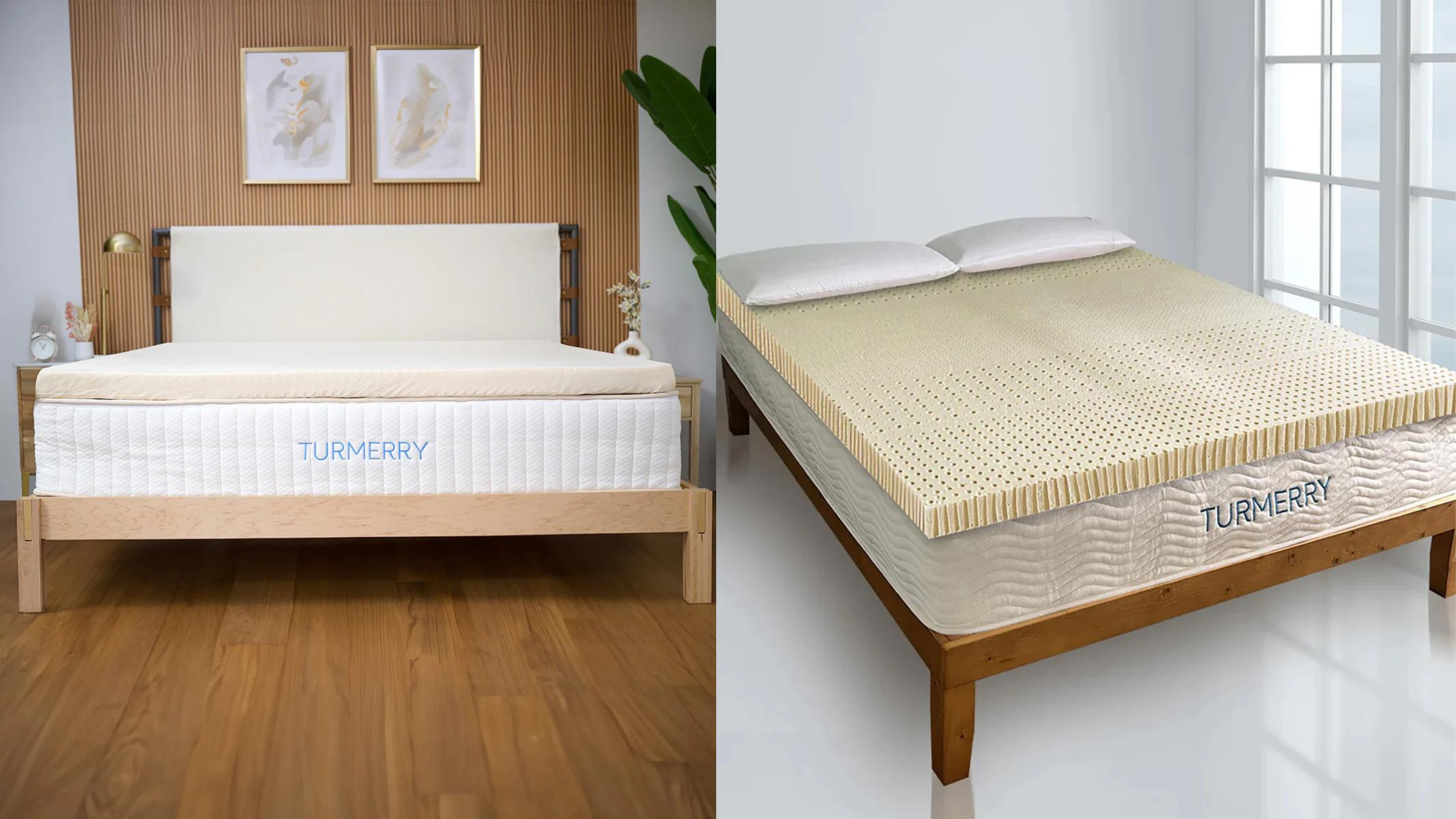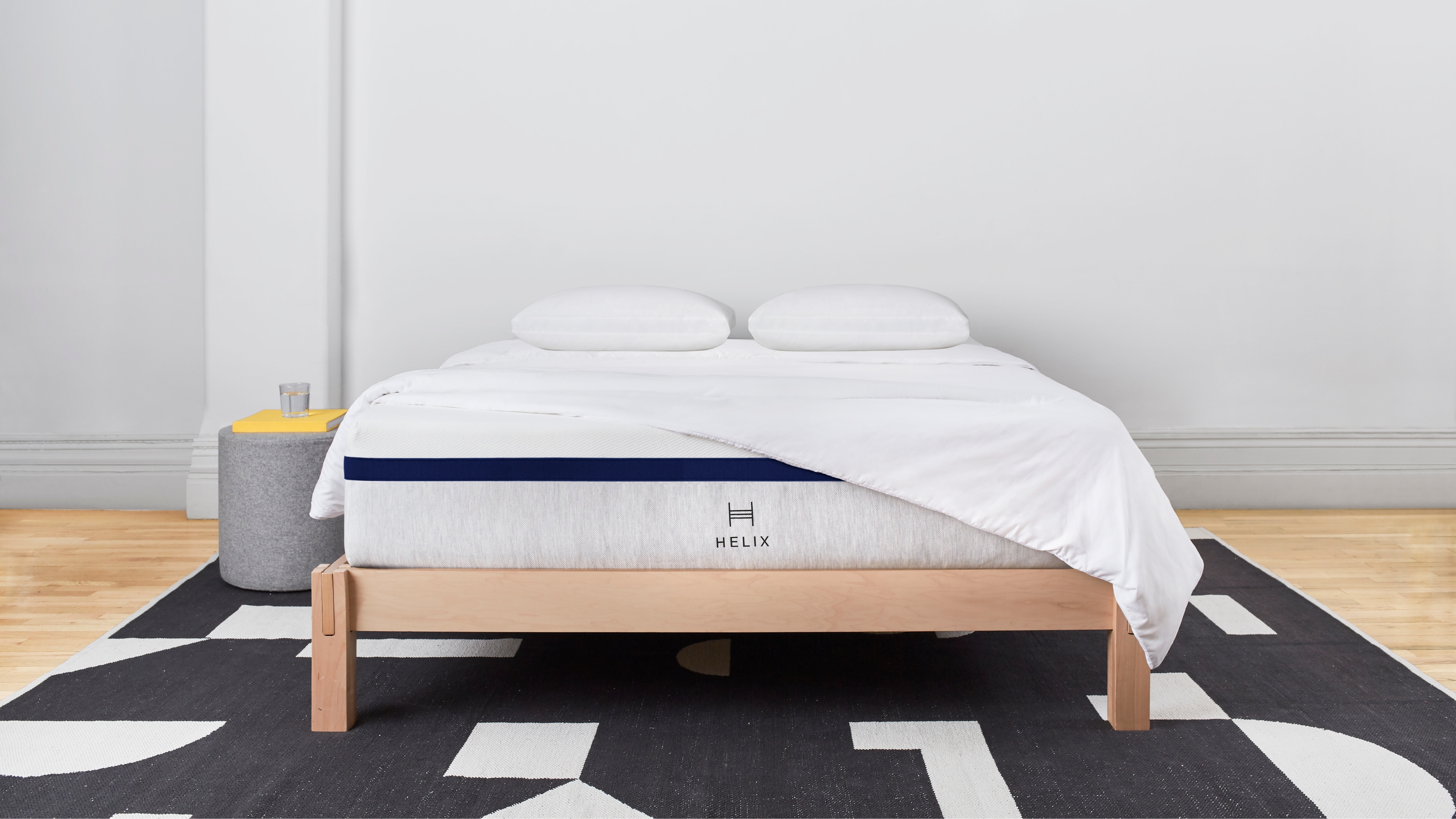
'How long does a mattress last?' is the question that might be on your mind in the middle of the night (or early in the morning) if you're feeling cranky and restless from an awful night's sleep.
We spend a lot of time on our mattresses – a third of our lives in fact. The years may even seem to fly by, and if you can't recall the last time you bought a mattress, or your mattress is no longer providing you with the great sleep it once did, it may be time to upgrade to a new one.
The general rule of thumb, according to medical experts and retail professionals is that a mattress should be replaced every seven to ten years (yes, even the best mattress you've paid that little extra for doesn't have superpowers).
However, that time frame isn't always so black and white. If you're asking 'how long does a mattress last?' and 'how long should a mattress last?' – don't be surprised to
hear two different answers.
Not only does it depend on the mattress type, but a number of factors come into play as to how long your mattress will last such as weight, sleeping in the same position every night, even jumping on the bed (thanks kids). Build quality and materials that are outside of your control are part of it too.
For instance, innerspring models last for around six to seven years; hybrids, around eight years, foam mattress around 10 years, and if it's good quality latex, it could last up to 15 years.
It's easy to get in the routine, the familiarity of your mattress, but if your mattress isn't working for you, it's time to recognize the signs and kick it to the curb (granted it's properly wrapped and disposed of safely of course). This decision will be better for your health and well-being. We promise.
And, if you're living in a rental where furniture is included, this guide will give you the power to ask your landlord to purchase a new one for you.

How long does a mattress last? And tell tale signs it's done
1. It's sagging, softening – and might even creak
A mattress that has lost its shape means it is no longer supports your body. For instance, innerspring mattresses may cause discomfort and create noises as indications of deterioration due to sagging and poking coils. Both memory foam and latex mattresses exhibit softening, sagging, and loss of support as a sign of their decline, according to April Mayer, sleep expert at Amerisleep.
She says: 'When you feel like you're trapped when at a particular part of the bed, those dips may mean that your bed is losing support.
Meanwhile, Victoria Wildhorn, sleep health content specialist for Mattress Clarity advises looking for noticeable body impressions (especially for heavier people) and to see if the mattress regains its shape after getting up.
While, Dr Frankie Jackson-Spence, a resident doctor at Time4Sleep advises: 'If your mattress is quite literally crying out for help, consider replacing it.'
2. You're waking up with aches and pains
Stiff neck, sore muscles, yes your mattress could be to blame, especially if you don't feel like it's supporting you, whether from getting old or being too soft or firm for your sleep position. The right mattress will allow your body to relax more completely during the night which allows your body to recover and for you to sleep better.
'When your mattress starts losing support it becomes harder to stay comfortable for long periods of time as the body is having to rely on muscles and joints to properly provide support,' says Dr. Alex Tauberg, a Pittsburgh-based chiropractor.
'When this starts to happen – waking up with pain or stiffness is common.'
And Alison Jones, a sleep expert at leading mattress brand Sealy, has the answer to what you should be looking for when shopping in-store or buying a mattress online. She says: 'No matter your sleep position, having a comfortable and supportive mattress that is tailored to your specific needs, isn’t something that should be compromised on.'
'For example, if back pain is keeping you awake, a mattress with core support springs will ensure the body’s key pressure points are properly supported, helping ease any discomfort.'
If your mattress is less than seven years old and you're suffering, be sure to also check out the frame it's sitting on. The best beds (be it platform, canopy or metal, or cane) will support the weight of you and your mattress, with no disruption to your dream time.
3. You can't find a comfortable sleep position
Over time, a mattress composition changes with wear and tear. If you find yourself tossing and turning in discomfort, the physical sign that your mattress could be to blame, or perhaps you don't have the best mattress that suits your sleep positions or even your body build. Lighter people will typically enjoy a softer mattress, while heavier people get the most support with firm mattresses.
'What many sleepers don’t realize is mattresses are not one size fits all - and a mattress that isn’t built for your specific body type will break down at a faster rate – resulting in the unsupportive 'mattress sag.' says Jeff Brown, president of Big Fig Mattress.
A temporary fix could be investing in the best mattress topper, but if it's nearing or past its recommended lifespan, we think it may just be more sensible to look into replacing it now, than down the line.
4. You're suffering from allergies
Mildew and dust mites can get trapped in your mattress, making you wake up with watery eyes, runny nose and headaches, said Wildhorn, who suggested looking for mattresses made of materials like latex and wool. So make sure you know how to get rid of dust mites naturally (as you won't want chemical products and residue so close to your face).
The number of dust mites, dead skin, and allergens that collect into a mattress over time can even cause it to gain weight. Astounding. Combat this by using an easily replaceable and washable mattress protector, and look for mattresses labeled as hypoallergenic, like latex ones.
Alternatively, if your mattress is reaching its golden years, you might choose to treat yourself to the best organic mattress, free from chemical nasties – and better for the planet too. Our Avocado green mattress review is a good place to start if you don't know much about eco-friendly bed furniture.
Should I replace my mattress if I have a bed bug infestation?
A telltale sign of bed bugs is black-looking ink marks on the mattress and waking up itchy, perhaps bites on your skin. Once a bed bug infestation is discovered, the natural thought may be to dispose of it immediately.
However, this is not recommended and could lead to further outbreaks in your building or neighbors. Instead, learn how to get rid of the bed bugs first.
Once your home is zapped clean of bed bugs and you know how to clean a mattress – what you do with your belongings is up to you.
This leads to the trauma or the memory of the bed bugs, according to Diana Ludwiczak, an NYC-certified bed bug specialist and CEO of Doctor Sniffs Bed Bug Dogs.
She says: 'People who cannot handle seeing or sleeping on the black stains will throw the bed away. Bed bugs often cause psychological trauma and many people get triggered each year during mosquito season. This is because the mosquitoes leave itchy marks and a person might be unsure if the bite is from a mosquito or a bed bug.'
A new mattress is not necessary if you have a bed bug issue, but it might definitely give you some peace of mind once everything is taken care of. And if you do choose to go down the mattress disposal route in the incident of bedbugs, make sure it's well wrapped.
Invest in a new mattress when moving
Moving soon? It may not be worth it to actually transport your mattress to a new locale. Whether you're doing it on your own, or hiring movers, between the struggle and the cost of labor, it might just be worth it, according to Tom Trainer, a moving professional and founder of Relocation Concierge.
There are lots of opportunities to recycle a mattress – another viable option with state-specific policies, so make sure you read up on your local rules and restrictions and don't just leave it out on the sidewalk, as this can produce a plethora of consequences for your neighborhood.
What about mattress warranties?
While most mattress companies offer warranties that expand as long as 10 to 25 years, oftentimes they require certain structural factors to be met, and sometimes, it's almost all too easy to have your warranty voided by not putting it on the right foundation (for example a mattress on the floor), owning it secondhand and staining. Different policies about repairing, replacing, or refunding based on how long you've had the existing mattress.
So, technically yes, if part of your mattress problems stems from structural issues (like sagging more than one inch, you may be able to take advantage of the warranty.
How can you tell if you need a new mattress?
As well as the physical condition of your mattress, you might want to review the changing family dynamics or how you progress in later years.
For example, if your child was sleeping in the same bed as you and your partner, and it is affecting your sleep (and perhaps intimacy), then investing in a good age-appropriate mattress might be a good option for your toddler. The Real Homes team can vouch for the Rem-Fit Kids' mattress if you're struggling to persuade your little one to give you some personal space.
Additionally, if you're experiencing premenopause, are perimenopausal, or going through 'the change', you might find that the best cooling mattress pads help to regulate their temperature and alleviate the uncomfortable feeling of hot flushes and night sweats – common symptoms associated with menopause. Of course, it's best to speak to your doctor or a medical professional to make sure this type of mattress is right for you.
These also come as a relief if you're trying to sleep in the summer months if you're trying to work out how to cool down a room fast and you're still feeling hot (and you don't want to splash out on the best fan or haven't got space). Feeling clammy might be down to your choice of duvet tog (rather than your mattress) so make sure you have the best duvet and best bedding for your comfort needs.
Join our newsletter
Get small space home decor ideas, celeb inspiration, DIY tips and more, straight to your inbox!

Jaclyn is an eCommerce editor at Future Home Interest, where she oversees sleep content including mattresses and bedding – in fact, she has passed our five-step certification process to become a verified customer advisor on mattresses. She regularly scouts out the best of the best for buying guides to help you fill your home with only the best. She joined the team in January 2021. She has previously worked with sites like Apartment Therapy, The Kitchn, The Spruce, The Spruce Eats, and MyDomaine, but got her start at the trade mag Home Furnishings News, which fueled her excitement for innovation in the home category and seeing the newest launches. When Jaclyn's not working, she loves long strolls through HomeGoods, unwinding with a chilled glass of Rosé, and entertaining her Cavapoo Reese.
-
 Shoppers approve of this Wayfair cooling mattress on sale now for less than $270
Shoppers approve of this Wayfair cooling mattress on sale now for less than $270See the Wayfair cooling mattress with over 18k reviews and 4.6 stars for summer sleeping. Plus, more cooling sleep essentials on sale now
By Emily Lambe Published
-

 Turmerry Latex Mattress Topper review: a perforated pick for the perfect night's sleep
Turmerry Latex Mattress Topper review: a perforated pick for the perfect night's sleepContributing editor, Paige Cerulli tests the Turmerry Latex Mattress Topper in her midwestern home
By Paige Cerulli Published
-
 6 best cooling mattress toppers and pads to buy — from $89.99
6 best cooling mattress toppers and pads to buy — from $89.99Half a dozen of the best cooling mattress toppers and pads to buy if you are a hot sleeper, or live in a warm climate. Including Surbtex and Tempur Pedic options
By Christina Chrysostomou Last updated
-

 The TEMPUR-Adapt mattress topper is a dreamy combo of cushion and support
The TEMPUR-Adapt mattress topper is a dreamy combo of cushion and supportOur contributing editor reviews the TEMPUR-Adapt mattress topper for two weeks in her home
By Paige Cerulli Published
-
 What is the happiest color for a small bedroom? Here's what experts recommend for a dopamine boost
What is the happiest color for a small bedroom? Here's what experts recommend for a dopamine boostWhat is the happiest color for a small bedroom? Paint experts from Benjamin Moore and Sherwin-Williams spill
By Danielle Valente Published
-
 Helix Midnight Mattress: As a front sleeper, I declare it the comfiest base I've ever slept on
Helix Midnight Mattress: As a front sleeper, I declare it the comfiest base I've ever slept onSee our Helix Midnight mattress review to see if this hybrid design is right for you. We tested it out for over one month to find all the pros and cons.
By Emily Lambe Published
-
 How to make a small bedroom cozy — designers reveal their non-negotiable rules
How to make a small bedroom cozy — designers reveal their non-negotiable rulesOur edit of how to make a small bedroom cozy features designer-backed tips and items to help achieve the look
By Danielle Valente Published
-

 Zinus ultra cool gel mattress topper review
Zinus ultra cool gel mattress topper reviewOur freelance contributor Camryn Rabideau shares her thoughts on the Zinus Ultra Cool Gel Memory Foam Mattress Topper after four weeks of sleeping on this temperature-reducing bedding accessory.
By Camryn Rabideau Published
